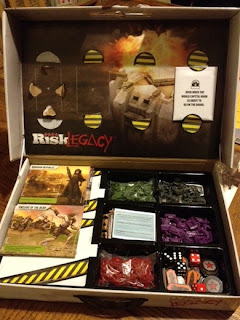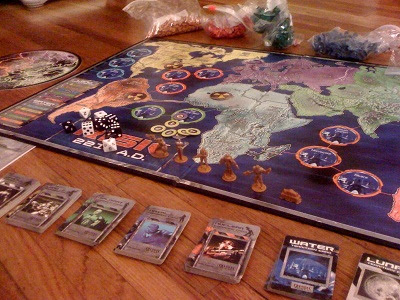I have drooled over Risk: Legacy since I first saw that it was coming out. So, when I moved to Philadelphia and was offered a spot with a group just starting a campaign of it, I jumped at the chance to join them! Now, let me tell you that we have played 5 of the 15 games so far - so, I have a good feel for how the game is played, but have not opened every pack. However, I am also intending to write this review without spoilers: so if you're looking for spoilers, this may not be for you, but if you're looking for a good feel on how the game is played, you don't have to worry about me ruining anything - everything I tell you should be found in the rulebook or was at least known to us
before we started playing our first game. (Note: I had a pretty picture of the board that we're using, but I realized that if you looked too closely, you might see a spoiler, so I removed it - I have checked all of the other pictures, and they are safe. The Enclave of the Bear pictures shows only a starting power - which you select before your first game.) With that said, let's dig into
Risk: Legacy!
 |
| Select your faction - with a starting power |
Risk: Legacy is Risk; but with extra stuff. In Legacy, each player starts with a headquarters and a handful of troops; all of which are on the headquarters. He also starts with a faction from the game. The first time that you play, each player selects a faction, but also gets to select which of two abilities that faction will be able to use - and that faction (not necessarily that player) will use it the rest of the time that you play Legacy. Your goal is to capture four "stars." If a player has never won a game, then he starts the game with a star. Each headquarters is a star, and you can also turn in four "resource" cards to gain a star. When playing the game, you basically play with standard Risk rules. You add up your number of territories (and add population based on cities that you own - this part is new), and divide by three, rounding down. This is the number of armies that you collect each turn (minimum of three). You also get extra armies for each continent you control. From here, you can attack as many territories as you want. The attacker can roll with up to three dice, the defender with two, and the defender wins ties. If you take a
contested territory on your turn (ie, you kill somebody else to do it), then at the end of the turn you get a card - when selecting a card, you can either select a card of a territory you control (territory cards can be worth anywhere from one to six resources), or you receive a standard resource card if you do not control any of the available countries. On future turns, you can trade in four cards for a star, or you can trade in cards for additional armies - if trading for armies, then the number of resources on the cards is added to determine how many you receive (with a bonus for having larger numbers). The only in-game change that I haven't mentioned are that you each will start the game with one "scar" card. These cards specify when they can be played, and to play them, you peel the sticker off of the card, place it on the appropriate territory, and then this affects that territory
the rest of the time you play this copy of Risk: Legacy! Gameplay continues like this until one person has collected four stars. Then, they win the game, and sign the board (meaning they will get a "missile" instead of a star to start the next game; missiles let you change a single die roll to be a 6). After signing the board, they have the option of naming a continent (giving them a permanent one army bonus whenever they control that continent), place a major city (a city with a population of two that only they can start in), destroy a resource card (rip it in half and never use it again), or a few other things. Anyone that was still alive can either place a minor city (population of one, but nobody can start there), or add a resource icon to a territory.
Ok, that was one of my longer introductions, but now it's time to get to the pros and cons. The first pro is that Risk: Legacy is the most innovative game that I believe I have ever played. I was incredibly hesitant when I first heard that you write on the board, destroy cards, and generally make your game vastly different than when you bought it. However, this part of the game works incredibly well. You truly feel like you are in a campaign throughout the game, and in later games, you will remember what happened in the earlier ones. This will also affect how you play - for example, we had one time when a player had named Australia. He refused to play any negative scars in Australia, because he knew that it would negatively affect him if he controlled Australia in future games. This ever-changing game is an amazing concept, and I am really hoping that more games do something similar. And, when I think about it from a financial perspective, if I pay $60 for a copy of Risk: Legacy, and I play it and enjoy it for the 15 games of the campaign, then I'm paying $4 per play - I have paid a lot more than that per play for many of my games!
 |
| I'm ready to open this! |
Next, I think that it is awesome that not each game has the same cards. When I was first reading about the game, I thought to myself, "ok, that'll be neat, but once I've played it 15 times, I'll have to move on." I now realize that I was wrong. First of all, for those of you that really enjoy the basic game of Risk, there's no real need to stop playing the game after 15 games - just because the world is no longer changing does not mean that the game itself is no longer playable. You can continue to play the game, and it will really feel like it is "your" version of Risk; because you and your friends will be the ones that caused the board to be setup how it is. However, if you constantly want the game to change, you can also figure out how to tell which copies have the same cards (I believe this is by serial number) and get a new copy of the game - one with different contents, and play through it again! Now, I don't know what all is different in the games, but I have looked at spoilers for the "Do Not Open. Ever." pack (oh, don't give me that look - we are playing on a friend's copy, and he keeps refusing to open it; you know "do not open" means "open me immediately"), and this has confirmed to me that there are different variants.
Now, those are really my only two pros to Risk: Legacy. But they are huge pros! So, instead of me trying to make something else up, let's just acknowledge that they are gigantic pros and count them both twice. So, now we're at four pros, and I can move on to the cons. Oh, I just remembered another one - the game goes much faster since you only have to get four stars instead of eliminating everyone. There you go, five pros.
The first con is that there is really very little change in the gameplay. Whereas all of
Risk 2210's changes are to the gameplay itself, in Risk: Legacy I found myself playing through the game in order to get to the post-game. I was ready to customize the board, open packs, etc., and the game itself was all secondary to this. If you enjoy Risk, you will have
no problem here at all! However, I do not enjoy the standard Risk, so I would often find myself bored while waiting for the game to end.
The second con is really more of the same. I don't like how easily strategy is derailed by poor dice rolling. There are some scar cards that can modify dice (make them plus one or minus one), but most of the game will be spent seeing who is better at rolling six-sided dice. I am not good at this. So, this part is incredibly frustrating.
Next, Australia is still overpowered. Whoever controls Australia will probably win the game. Fortunately, this one has a caveat - you can fix this. Since the winner of a game can make a continent bonus plus one or minus one, you can make Australia only worth one extra army instead of two. Plus, one of the scar cards (ammo shortage) makes it harder to defend a country. In addition, players cannot start on "scarred" territories, so this also can prevent players from being allowed to even start in certain territories in Australia. However, in your first few games, this might be a problem.
 |
| What's in the box |
Finally, because of the abbreviated timeframe in Risk: Legacy, I think that a player who is close to being knocked out (the difference between "knocked out" and "eliminated" is that if all of your armies are destroyed, you start your next turn with half of your initial armies on any valid starting territory; "eliminated" means there are no starting territories) has very little chance to come back in the game. Not only have you probably lost your own headquarters, but it is incredibly difficult to ever accumulate enough armies to actually challenge the other players that are still doing well - especially since they are collecting more armies than you each turn. Your only chance is to somehow stay alive (if you are knocked out, then they get to take all of your resource cards), gather enough resource cards to get a large amount of reinforcements, and hope that your opponents fight
a lot in the meantime. And, if they see you gathering resource cards, they will probably only leave you alone if one of them is close to winning the game (since they will know that they can steal your cards, which will help them win).
Overall, I give Risk: Legacy an 8.0/10. I absolutely
love the ever-changing game. However, the ever-changing game is all centered around Risk. I wish that they had started with
Risk 2210 and had then added the changing board to it - having a combination of new gameplay and new outside the game effects. Either way, I love that Risk: Legacy has introduced an entirely new idea into board games - one that I am very excited to see if people will incorporate into future games!
If you like war games, you might also check out
Summoner Wars,
Test of Fire: Bull Run 1861, and
Axis and Allies: Pacific. Or, if you want another opinion, check out this
Risk Legacy Review on Play Board Games.
NOTE: I have been informed since writing this review that the only packet with variance is the "Do Not Open. Ever." packet.





